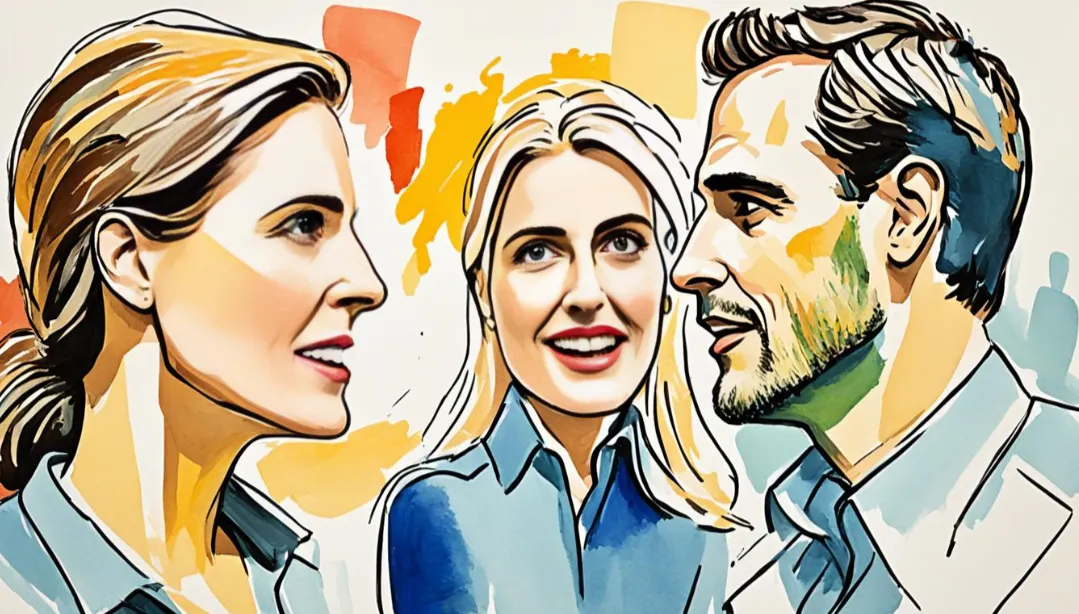Communication Skills That Transform Relationships
Have you ever thought about why some talks make relationships stronger, while others seem to break them? The key is in how we communicate. Experts like Lyubomirsky (2008) and Fredrickson & Joiner (2002) say being able to share our thoughts and feelings is vital for being happy and satisfied.
Effective communication in relationships means more than just talking. It's about sharing your thoughts and emotions clearly. It's a complex mix of talking, listening, understanding, and going beyond what's on the surface. Learning to do this well, and pushing past your own views, helps build real connections that last.

Key Takeaways
- Effective communication is essential for happiness and life satisfaction.
- Healthy communication goes beyond words, involving thoughts, feelings, and expectations.
- Personal biases and filters can distort messages, making understanding crucial.
- Success in communication requires attentiveness to multiple dimensions of interaction.
- Building strong relationships depends on seamless and clear communication.
The Importance of Effective Communication in Relationships
Good communication is key for strong relationships. It meets our basic human need to connect. When we misunderstand each other, it can lead to fights. But using good communication skills makes interactions better.
Understanding the Basics
Learning how to communicate isn't just about sharing info. It's about understanding each other's feelings and expectations. By decoding messages well, we improve relationships and solve problems better.
The Role of Non-Verbal Communication
Most of our communication is actually non-verbal. Using good body language and listening skills is vital. They prevent fights by making meanings clear and building deeper connections.
Benefits of Effective Communication
Improving how we talk helps in many ways. It makes solving problems easier. Plus, it lets people express what they need clearly. This creates a space for growth and learning together.
By practicing good communication, we can make our relationships better. We can communicate in more meaningful and positive ways.
Elements of Healthy Communication
Healthy communication is key to strong relationships. It mixes good talk tactics with people skills. We'll talk about what makes for great, clear chats here.
Active Listening
Active listening goes way beyond just hearing. It means giving your ears, eyes, and heart to someone. This way, everyone feels important because they are truly heard.
- Maintain eye contact
- Use affirming gestures such as nodding
- Ask clarifying questions to deepen understanding
Emotional Intelligence
Understanding and navigating emotions is vital for meaningful connections. It involves knowing your feelings and those of others. This makes us kinder and helps us zap disputes before they grow too big.
"Emotional intelligence is the ability to make emotions work for you, instead of against you." - Travis Bradberry.
Open Dialogue
Open discussion helps everyone see each other clearly. It makes sharing thoughts and feelings safe and easy. This builds trust and finds solutions that fit everyone. It keeps relationships strong and steady.

By really listening, understanding emotions, and talking openly, friends can keep their connection strong, leading to happier and closer relationships.
Common Communication Barriers
Understanding the many hurdles in communication is key to better relationships. Talking and listening aren't enough. It's about being clear and making sure others get what you're saying.

Misinterpretation of Messages
Mistaking messages is a big issue when talking. How we see things can be different, leading to wrong ideas and hurt feelings. To avoid this, make sure everyone understands what’s meant.
Emotional Blockages
Feelings like anger or fear can block how we talk, stopping us from sharing or understanding. To overcome this, it's important to control emotions and try to understand others.
Over-Communication Pitfalls
Talking too much can be as bad as not talking enough. Too much information or talking confusingly can lose people. Keeping it clear and to the point helps build good conversations.
Knowing and dealing with these barriers is important. You can try to explain better, be aware of your feelings, and keep messages simple. This helps keep your talks healthy.
Effective Communication Techniques
Learning how to communicate well is key to strong relationships. Good communication builds understanding and trust between people. In this section, we'll explore how to improve our communication, which will lead to more meaningful talks and better relationships.
Active Listening Techniques
Active listening is a crucial part of talking effectively. It means giving your full attention to the speaker. Show you're listening by nodding and thinking about what's being said. Doing this helps avoid misunderstandings, makes the speaker feel respected, and strengthens your bond with them.
Nonviolent Communication
Marshall B. Rosenberg created nonviolent communication. It's about sharing thoughts and feelings without blame. This method encourages honesty and understanding, making people closer emotionally. It helps people talk about problems without upsetting others, leading to real and open discussions.
Conflict Resolution Strategies
Solving conflicts is vital for healthy relationships. It's about looking at the conflict deeply and using techniques like negotiation. Sometimes, it’s good to take a break to think things over. These methods lead to solutions that everyone can agree on. They help build trust and teamwork.
FAQ
What are the basics of effective communication in relationships?
Effective communication means more than just sharing info. It's also about understanding each other. This involves listening, knowing your emotions, and reading body language.
How important are non-verbal cues in communication?
Non-verbal communication is key, making up more than 80% of how we understand each other. Things like facial expressions and how someone stands can say a lot more than words alone.
What are the benefits of mastering effective communication skills?
Being a good communicator leads to better conflict resolution and clearer needs. It builds strong relationships and makes people happier together.
How does active listening improve communication?
Active listening is all about really hearing what's being said. It involves asking questions to make sure you get it right. This deepens understanding and prevents confusion.
What role does emotional intelligence play in communication?
Emotional intelligence helps us understand and manage our feelings and those of others. This makes us more empathetic and able to have stronger relationships.
Why is open dialogue crucial in relationships?
Talking openly builds trust. It means being able to discuss issues fully and fairly. This leads to solutions that meet everyone's needs.
What are some common barriers to effective communication?
Misunderstandings stem from our biases, fear of speaking the truth, and even talking too much. Overcoming these hurdles is critical for clear communication.
How can one overcome the misinterpretation of messages?
To avoid misinterpretation, always check if you understood correctly. Asking for feedback and being aware of bias can clarify things. Paraphrasing can also help.
What are emotional blockages, and how do they affect communication?
Emotional blockages prevent us from speaking or listening honestly. They also cause confusion and might lead to fights. To overcome these, control your emotions and talk openly.
What are the pitfalls of over-communication?
Too much talking confuses and bogs you down in detail. Could you stick to what's relevant for communication to stay clear and effective?
What are some effective techniques for active listening?
To listen well, focus, show that you're really hearing, and repeat back what you understood. This ensures that you get the message right.
What is Nonviolent Communication?
Nonviolent Communication is a way of talking that's free of judgment. It's all about being understanding and aiming for what everyone needs.
What strategies can be employed for conflict resolution?
To resolve conflicts, understand everyone's side. Use negotiation and take a break to cool down. This helps find solutions that work for all.


